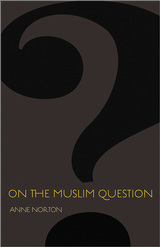 |
On the Muslim Question
|
| In the post-9/11 West, there is no shortage of strident voices telling us that Islam is a threat to the security, values, way of life, and even existence of the United States and Europe. For better or worse, “the Muslim question” has become the great question of our time. It is a question bound up with others–about freedom of speech, terror, violence, human rights, women’s dress, and sexuality. Above all, it is tied to the possibility of democracy. In this fearless, original, and surprising book, Anne Norton demolishes the notion that there is a “clash of civilizations” between the West and Islam. What is really in question, she argues, is the West’s commitment to its own ideals: to democracy and the Enlightenment trinity of liberty, equality, and fraternity. In the most fundamental sense, the Muslim question is about the values not of Islamic, but of Western, civilization.Moving between the United States and Europe, Norton provides a fresh perspective on iconic controversies, from the Danish cartoon of Muhammad to the murder of Theo van Gogh. She examines the arguments of a wide range of thinkers–from John Rawls to Slavoj Žižek. And she describes vivid everyday examples of ordinary Muslims and non-Muslims who have accepted each other and built a common life together. Ultimately, Norton provides a new vision of a richer and more diverse democratic life in the West, one that makes room for Muslims rather than scapegoating them for the West’s own anxieties.Anne Norton is professor of political science at the University of Pennsylvania. Her books include Leo Strauss and the Politics of American Empire; 95 Theses on Politics, Culture, and Method; and Republic of Signs.Endorsement:“This is an extraordinary book–an impassioned, astute, and erudite critique that strongly refutes the ‘clash of civilizations’ rhetoric and the stereotypes shaping contemporary discussions of Muslims in the West. It further proposes a concrete alternative vision of democracy in diverse societies. The argument is original and sophisticated and the writing is beautiful–graceful, assertive, and clear. I think this book will achieve instant status as a classic of our time.”–Joan W. Scott, Institute for Advanced Study”This is a crisp and bracing snapshot of the ways in which the so-called Muslim problem serves as a repository for a host of Euro-American anxieties, fears, and doubts rather than as an accurate reflection of Islam or the behavior of actual Muslims. One of the great strengths of the book is how it joins a wonderfully eclectic journey through politics, film, scholarship, clothing, fiction, and language with an attention to the different ways the United States and Europe formulate and respond to ‘the Muslim problem.”–Roxanne Euben, Wellesley College
Foreword by Ruth O’Brien ix
Part II In the Western Street
Acknowledgments 229 Series:
|


 Where to buy this ebook
Where to buy this ebook